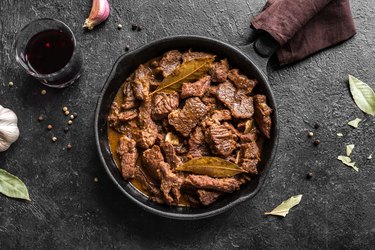
It's unfortunately far too easy to end up with a thin, watery beef stew. This usually happens when you've added too much liquid to your mix, essentially turning your stew into a soup.
Luckily, it's easy to use flour, starch, vegetables and grains to thicken beef stews.
Video of the Day
Video of the Day
Using Flour vs. Roux to Thicken Stew
Watery stews occur when you have a lot of liquid in your stew but not enough time to let the mixture reduce. You can also end up with a watery beef stew when you've added a lot of vegetables. Zucchini, celery, peppers and tomatoes all have a high water content that can increase the total volume of liquid in your stew.
Thin, watery stews are easily thickened by adding flour. You can use any flour, from regular white flour to more nutritious flours like cassava or chickpea flour.
If you want to add flour to thicken your stew, you'll need to first make a roux — a mixture of flour and fat. It's possible to add flour directly to your stew, but this is likely to produce unpleasant lumps. Using a roux prevents these lumps from forming. To make a roux to thicken your watery beef stew, you'll only need those two ingredients, mixed at a 1-1 ratio.
Preparing Healthy Homemade Roux
Most people use animal-based fats like ghee or butter when making the roux. However, if you're keeping an eye on your saturated fat intake, you can use plant-based fat. The American Heart Association says that peanut, soybean and olive oils are all low in saturated fat.
Here's how to make a roux, according to the Auguste Escoffier School of Culinary Arts:
- Heat Your Fat: Heat 1/2 cup of ghee or your chosen fat in a saucepan at medium heat.
- Whisk in Flour: Whisk your chosen flour into the fat
—
slowly. You'll need 1/2 cup of the flour in total. Make sure you don't add it all in at once!
- Stir Constantly: Stir the mixture for about 10 to 15 minutes. Roux made with vegetable oil can take twice as long to cook. The flour should form a thick paste as it's combined with the fat. Make sure you cook it at medium heat and that your mixture doesn't get too hot. If you cook your roux for longer, it will turn darker. This is fine, as long as it doesn't burn.
- Add Roux to Your Stew: Separate out 1/4 cup of your roux (a quarter of the total mixture) after it's cooked. Add a ladle or two of stew liquid to the roux and mix thoroughly. Once it's mixed, you can add the roux and liquid back into your stew. This last step prevents the flour from forming lumps when added to the stew.
You'll need at least 3 ounces (88 milliliters) of roux for every quart (950 milliliters) of beef stew that you've made. If your stew still isn't thick enough, keep adding more of the roux you prepared. If need be, you can just repeat this last step until you've obtained the thickness you want from your stew.
How to Thicken Stews With Natural Starches
If you don't want to take the time to make a roux, you can use a few spoonfuls of starch, instead. Starch is a component of flour. It can be made from a variety of different plant-based products, including grains and vegetables. Common starches include:
- wheat starch
- cornstarch
- potato starch
- rice starch
- tapioca (cassava starch)
Alternatively, you could incorporate foods with high starch content into the stew. The Mayo Clinic says that starch is naturally found in vegetables, grains and legumes.
Although you can incorporate just about any starchy vegetable into your beef stew, keep in mind that certain ingredients will affect your stew's total cooking time. For instance, adding in shredded cassava or cooked potatoes will thicken your beef stew quickly. However, dried lentils will take a while to cook and can affect your stew's flavor.
If you need to thicken your stew but don't have any vegetables on hand, you can use certain grains. Harvard Health Publishing recommends eating whole grains, because these are a valuable source of dietary fiber. Fine bulgur, couscous and quinoa all cook rapidly, making them easy to incorporate if you need to thicken your stew at the last minute.
- Mayo Clinic: "Carbohydrates: How Carbs Fit Into a Healthy Diet"
- Harvard Health Publishing: "The Wholesome Goodness of Grains"
- American Heart Association: "Healthy Cooking Oils"
- Indiana Public Media: Moment of Science: "The Rest is Gravy"
- Auguste Escoffier School of Culinary Arts: "How to Make a Roux"